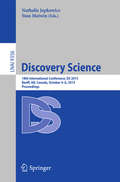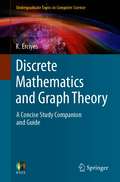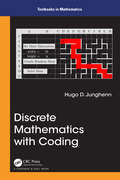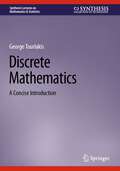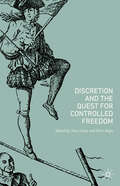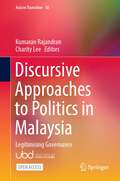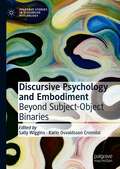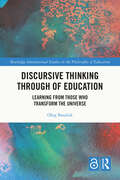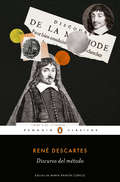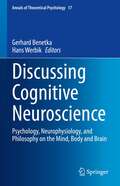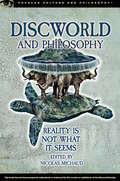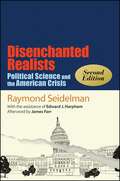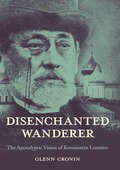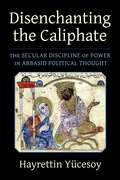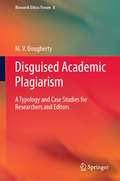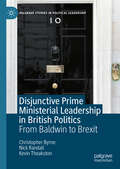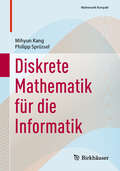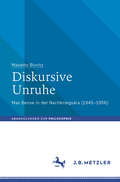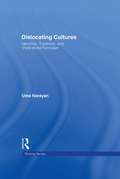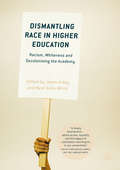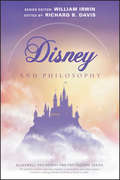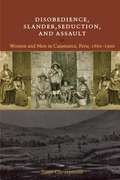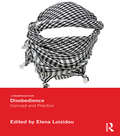- Table View
- List View
Discovery Science
by Nathalie Japkowicz Stan MatwinThis book constitutes the proceedings of the 17th International Conference on Discovery Science, DS 2015, held in banff, AB, Canada in October 2015. The 16 long and 12 short papers presendted together with 4 invited talks in this volume were carefully reviewed and selected from 44 submissions. The combination of recent advances in the development and analysis of methods for discovering scienti c knowledge, coming from machine learning, data mining, and intelligent data analysis, as well as their application in various scienti c domains, on the one hand, with the algorithmic advances in machine learning theory, on the other hand, makes every instance of this joint event unique and attractive.
Discrete Mathematics and Graph Theory: A Concise Study Companion and Guide (Undergraduate Topics in Computer Science)
by K. ErciyesThis textbook can serve as a comprehensive manual of discrete mathematics and graph theory for non-Computer Science majors; as a reference and study aid for professionals and researchers who have not taken any discrete math course before. It can also be used as a reference book for a course on Discrete Mathematics in Computer Science or Mathematics curricula. The study of discrete mathematics is one of the first courses on curricula in various disciplines such as Computer Science, Mathematics and Engineering education practices. Graphs are key data structures used to represent networks, chemical structures, games etc. and are increasingly used more in various applications such as bioinformatics and the Internet. Graph theory has gone through an unprecedented growth in the last few decades both in terms of theory and implementations; hence it deserves a thorough treatment which is not adequately found in any other contemporary books on discrete mathematics, whereas about 40% of this textbook is devoted to graph theory. The text follows an algorithmic approach for discrete mathematics and graph problems where applicable, to reinforce learning and to show how to implement the concepts in real-world applications.
Discrete Mathematics with Coding (Textbooks in Mathematics)
by Hugo D JunghennThis book, for a first undergraduate course in Discrete Mathematics, systematically exploits the relationship between discrete mathematics and computer programming. Unlike most discrete mathematics texts focusing on one of the other, the book explores the rich and important connection between these two disciplines and shows how each discipline reinforces and enhances the other. The mathematics in the book is self-contained, requiring only a good background in precalculus and some mathematical maturity. New mathematical topics are introduced as needed. The coding language used is VBA Excel. The language is easy to learn, has intuitive commands, and the reader can develop interesting programs from the outset. Additionally, the spreadsheet platform in Excel makes for convenient and transparent data input and output and provides a powerful venue for complex data manipulation. Manipulating data is greatly simplified using spreadsheet features and visualizing the data can make programming and debugging easier. The VBA language is seamlessly integrated into the spreadsheet environment with no other resources required. Furthermore, as some of the modules in the book show, intricate patterns, graphs, and animation in the form of moving cells is possible. Features Introduces coding in VBA Excel assuming no previous coding experience. Develops programs in Linear Analysis, Logic, Combinatorics, Probability, and Number Theory. Contains over 90 fully tested and debugged programs. The code for these is as well as the exercises is available on the author's website. Contains numerous examples that gradually introduce the reader to coding techniques. Includes programs that solve systems of linear equations, linear programming problems, combinatorial problems, Venn diagram problems and programs that produce truth tables from logic statements and logic statements from switching and gate circuits, encrypt and decrypt messages and simulate probability experiments.
Discrete Mathematics: A Concise Introduction (Synthesis Lectures on Mathematics & Statistics)
by George TourlakisThis book is ideal for a first or second year discrete mathematics course for mathematics, engineering, and computer science majors. The author has extensively class-tested early conceptions of the book over the years and supplements mathematical arguments with informal discussions to aid readers in understanding the presented topics. “Safe” – that is, paradox-free – informal set theory is introduced following on the heels of Russell’s Paradox as well as the topics of finite, countable, and uncountable sets with an exposition and use of Cantor’s diagonalisation technique. Predicate logic “for the user” is introduced along with axioms and rules and extensive examples. Partial orders and the minimal condition are studied in detail with the latter shown to be equivalent to the induction principle. Mathematical induction is illustrated with several examples and is followed by a thorough exposition of inductive definitions of functions and sets. Techniques for solving recurrence relations including generating functions, the O- and o-notations, and trees are provided. Over 200 end of chapter exercises are included to further aid in the understanding and applications of discrete mathematics.
Discrete or Continuous?
by Amit HagarThe idea of infinity plays a crucial role in our understanding of the universe, with the infinite spacetime continuum perhaps the best-known example - but is spacetime really continuous? Throughout the history of science, many have felt that the continuum model is an unphysical idealization, and that spacetime should be thought of as 'quantized' at the smallest of scales. Combining novel conceptual analysis, a fresh historical perspective, and concrete physical examples, this unique book tells the story of the search for the fundamental unit of length in modern physics, from early classical electrodynamics to current approaches to quantum gravity. Novel philosophical theses, with direct implications for theoretical physics research, are presented and defended in an accessible format that avoids complex mathematics. Blending history, philosophy, and theoretical physics, this refreshing outlook on the nature of spacetime sheds light on one of the most thought-provoking topics in modern physics.
Discretion and the Quest for Controlled Freedom
by Tony Evans Peter HupeLooking at discretion broadly as the exercise of controlled freedom, this edited volume introduces insights from a range of social sciences perspectives. Traditionally, discussions of discretion have drawn on legal notions of the appropriate exercise of legitimate authority specified by legislators. However, empirical and theoretical studies in the social sciences have extended our understanding of discretion, moving us beyond a narrow legal view. Contributors from a range of disciplines explore the idea of discretion and related notions of freedom and control across social and political practices and in different contexts. As this complex and important topic is discussed and examined, both total control and unconstrained freedom appear to be illusions.
Discursive Approaches to Politics in Malaysia: Legitimising Governance (Asia in Transition #18)
by Kumaran Rajandran Charity LeeThis open access book examines Malaysian politics using a linguistic perspective. It explores how language serves to (de)legitimise governance, and its subsequent policies and activities in Malaysia. Grounded in discourse studies, this edited volume presents research on the discourses produced by and on Barisan Nasional, Pakatan Harapan and Perikatan Nasional from 2008 to 2020, studying how political actors (de)legitimise their governance through discursive means. The thirteen original chapters select spoken, print and digital texts in English, Malay, Mandarin and Tamil, and deploy varied theoretical and methodological approaches. Their linguistic analysis unearths the language features and strategies that facilitate (de)legitimation. It shows how political actors shape the discursive representation and evaluation of multiple concerns in Malaysia. Consequently, Discursive Approaches to Politics in Malaysia: Legitimising Governance improves our understanding of contemporary Malaysian political discourse. It is of interest to graduates and researchers in the field of discourse studies, seeking to understand the discursive contours of politics in this developing Asian country.
Discursive Psychology and Embodiment: Beyond Subject-Object Binaries (Palgrave Studies in Discursive Psychology)
by Sally Wiggins Karin Osvaldsson CromdalFor over thirty years, discursive psychology has offered a robust challenge to cognitivist approaches to psychology, demonstrating the relevance of discursive practices for understanding psychological topics and social interaction. Matters of embodiment – the visceral, sensory, physical aspects of psychology – have, however, so far received much less attention. This book is the first text to address the theoretical and analytical challenges raised by bodies in interaction for discursive psychology. The book brings together international experts, each of which tackles a different topic area and interactional setting to examine embodiment as a social object. The authors consider the issue of subject-object relations and how ‘inner’ psychological subject-side states are constructed and enacted in relation to object-side states through embodied discursive practices. How do bodily processes become particular kinds of embodiment through and within social interaction? How are bodies psychologised as social objects? Moving beyond dualisms of the subject/object that construct an ‘inner’ and ‘outer’ psychological state, the book pushes forward contemporary theory and analysis within discursive psychology. Discursive Psychology and Embodiment is therefore an essential resource for researchers across the social sciences working within discourse, social interaction, and the ‘turn to the body’.
Discursive Thinking Through of Education: Learning from Those Who Transform the Universe (Routledge International Studies in the Philosophy of Education)
by Oleg BazalukThis book is a contribution to the philosophical discourse on education. Education is considered as a tool of philosophy. Education (paideia) and politics (politeia) are equal in importance for building a sustainable society free from feud and unhappiness. Discursive thinking through of education is based on Plato’s dialogues and the results of epistemological, metaphysical and ethical research in the fields of cosmology, biology and neuroscience. The author demonstrates the potential of the threefold scheme of philosophy, a Platone philosophandi ratio triplex, for ordering individual and collective discourse and way of life in strict accordance with the intelligible complexity of the expanding cosmos. An essential read for students and scholars interested in the crossroad between education and philosophy.
Discurso del método
by René DescartesEl discurso del método es un referente inescapable de la filosofía moderna. El Discurso del método vio la luz en 1637 bajo anonimato. Habían transcurrido cuatro años desde la condena de Galileo. Descartes, tal vez guiado por la prudencia y por enfatizar su voluntad de diálogo, se inclinó por proponer un discurso en lugar de un tratado. En esta obra, la más célebre del filósofo francés y en la que aparece la famosa frase «pienso, luego existo», desarrolla un método inspirado en sus trabajos científicos y basado en la duda sistemática, que le permitió establecer las bases del conocimiento. El resultado es uno de los libros más importantes de la de la historia del pensamiento occidental, que supuso un punto de inflexión en la ciencia y la filosofía moderna. La presente edición está a cargo de María Ramon Cubells, profesora titular en la Universidad Rovira i Virgili y experta en filosofía moderna. Además de la magnífica introducción que nos adentra en una de las obras cruciales del pensamiento, también ha desarrollado un aparato de notas que complementan y enriquecen la lectura.
Discussing Cognitive Neuroscience: Psychology, Neurophysiology, and Philosophy on the Mind, Body and Brain (Annals of Theoretical Psychology #17)
by Gerhard Benetka Hans WerbikThe sciences philosophy, psychology and neuroscience share the basis that all refer to the human being. Therefore, an interdisciplinary collaboration would be desirable. The exchange of criticism is an essential requirement for interdisciplinary collaboration. Criticism must be heard and – if possible – considered. Indeed, criticism can be valid or unwarranted. However, whether criticism is unwarranted can only emerge from discussion and conversation. In the discussion of cognitive neuroscience, some criticism can easily be considered (such as the mereological fallacy that represents that talking about the person is substituted with talking bout the brain). Another issue for an interdisciplinary discussion of cognitive neuroscience is the interpretation of the readiness potential including re-considering Benjamin Libet’s classic experiments. Additionally, a critical discussion on cognitive neuroscience must address ethical questions, such as the possibility of the abuse of neuroscientific insight.
Discworld and Philosophy
by Nicolas MichaudIn Discworld, unlike our own frustrating Roundworld, everything makes sense. The world is held up by elephants standing on the back of a swimming turtle who knows where he's going, the sun goes round the world every day, so it doesn't have to be very hot, and things always happen because someone intends them to happen. Millions of fans are addicted to Pratchett's Discworld, and the interest has only intensified since Pratchett's recent death and the release of his final Discworld novel, The Shepherd's Crown, in September 2015. The philosophical riches of Discworld are inexhaustible, yet the brave explorers of Discworld and Philosophy cover a lot of ground. From discussion of Moist von Lipwig's con artistry showing the essential con of the financial system, to the examination of everyone's favorite Discworld character, the murderous luggage, to the lawless Mac Nac Feegles and what they tell us about civil government, to the character Death as he appears in several Discworld novels, Discworld and Philosophy gives us an in-depth treatment of Pratchett's magical universe. Other chapters look at the power of Discworld's witches, the moral viewpoint of the golems, how William de Worde's newspaper illuminates the issue of censorship, how fate and luck interact to shape our lives, and why the more simple and straightforward Discworld characters are so much better at seeing the truth than those with enormous intellects but little common sense.
Disenchanted Realists, Second Edition: Political Science and the American Crisis (SUNY series in Political Theory: Contemporary Issues)
by Raymond SeidelmanWhen it first appeared three decades ago, Raymond Seidelman's provocative study of the history of political science both attracted a great deal of attention and generated vibrant controversy. Where prior studies of the history of political science had concentrated on the evolution of the scientific study of politics, Seidelman placed his focus on the tenuous relationship between the scientific study of politics and the real world of American democracy. Examining paired sets of political science luminaries over a century, he finds recurrent hopes that a "science of politics" can be a "science for politics," and recurrent frustrations that neither elites nor democratic publics respond to the findings of political science or defer to its claims of scientific authority. Analyzing the reasons for political science's limited impact on democratic reform, Seidelman raises the prospect that the progressive dreams of American political science, rising and falling over the course of a century, may finally be exhausted.For this new edition, Bruce Miroff and Stephen Skowronek have written a foreword that relates the genesis of the book and the career of the late Ray Seidelman, while James Farr, a distinguished scholar of political science history, has contributed an extensive afterword. Whether readers concur with or dispute Seidelman's conclusions about the practical significance of political science, they will be challenged by the scope and power of Disenchanted Realists. The book invites a new generation of political scientists to examine the problematic development of the discipline they practice and to reflect on the public meanings of what they do in their own careers.
Disenchanted Wanderer: The Apocalyptic Vision of Konstantin Leontiev (NIU Series in Slavic, East European, and Eurasian Studies)
by Glenn CroninDisenchanted Wanderer is the first comprehensive English-language study in over half a century of the life and ideas of Konstantin Nikolaevich Leontiev (1831–1891), one of the most important thinkers in nineteenth-century Russia on political, social, and religious matters. Glenn Cronin gives the reader a broad overview of Leontiev's life and varied career as novelist, army doctor, diplomat, journalist, censor, and, late in life, ordained monk. Reviewing Leontiev's creative work and his writing on aesthetics and literary criticism—notable figures such as Belinsky, Turgenev, Gogol, Dostoevsky, and Tolstoy appear—Cronin goes on to examine Leontiev's sociopolitical writing and his theory of the rise and fall of cultures and civilizations, placing his thought in the context of his contemporaries and predecessors including Hegel, Herzen, and Nietzsche, as well as Danilevsky, Pobedonostsev, and other major figures in Slavophile and Russian nationalist circles.Cronin also examines Leontiev's religious views, including his ascetic brand of Orthodoxy, informed by his experiences of the monastic communities of Mount Athos and OptinaPustyn, and his late attraction to Roman Catholicism under the influence of the theologian Vladimir Solovyev. Disenchanted Wanderer concludes with a review of Leontiev's prophetic vision for the twentieth century and his conviction that, after a period of wars, socialism would triumph under the banner of a new Constantine the Great. Cronin considers how far this vision foretold the rise to power of Joseph Stalin, an aspect of Leontiev's legacy that previously had not received the attention it merits.Elevating Leontiev to his proper place in the Russian literary pantheon, Cronin demonstrates that the man was not, as is often maintained, an amoralist and a political reactionary but rather a deeply moral thinker and a radical conservative.
Disenchanting the Caliphate: The Secular Discipline of Power in Abbasid Political Thought (Columbia Studies in International and Global History)
by Hayrettin YücesoyThe political thought of Muslim societies is all too often defined in religious terms, in which the writings of clerics are seen as representative and ideas about governance are treated as an extension of commentary on sacred texts. Disenchanting the Caliphate offers a groundbreaking new account of political discourse in Islamic history by examining Abbasid imperial practice, illuminating the emergence and influence of a vibrant secular tradition.Closely reading key eighth-century texts, Hayrettin Yücesoy argues that the ulema’s discourse of religious governance and the political thought of lay intellectuals diverged during this foundational period, with enduring consequences. He traces how notions of good governance and reflections on prudent statecraft arose among cosmopolitan literati who envisioned governing as an art. Competent in nonreligious branches of knowledge and trained in administrative professions, these belletrists articulated and defended secular political practices, reimagining the caliphal realm as politically constituted rather than natural. They sought to improve administrative efficiency and bolster state control for an empire made up of diverse cultures. Their ideas about moral cultivation, temporal reasoning, and governmental rationality endured for centuries as a counterpoint to religious rulership. Drawing on this history, Yücesoy critiques the concept of “Islamic political thought,” calling for decolonizing debates about “secular” and “religious” politics.Theoretically rich and historically grounded, Disenchanting the Caliphate is an insightful and provocative reconsideration of key strands of political discourse in the intellectual history of Muslim societies.
Disguised Academic Plagiarism: A Typology and Case Studies for Researchers and Editors (Research Ethics Forum #8)
by M. V. DoughertyThis volume is the first book-length study of disguised forms of plagiarism that mar the body of published research in humanities disciplines. As a contribution to applied research ethics, this practical guide offers a typology of the principal forms of disguised plagiarism. It provides detailed analyses, in-depth case studies, and useful flow charts to assist researchers, editors, and publishers in protecting the integrity of the body of published research literature. Disguised plagiarism is more subtle than copy-and-paste plagiarism; all its varieties involve some additional concealment that creates further distance between the plagiarizing text and its source. These disguised forms are the most difficult forms of plagiarism to detect. Readers of the volume will become acquainted with the subtler forms of plagiarism that corrupt the production and dissemination of knowledge in humanities fields. The book is valuable not only to those interested in research ethics, but also to those in humanities fields including philosophy, theology, and history.
Disjunctive Prime Ministerial Leadership in British Politics: From Baldwin to Brexit (Palgrave Studies in Political Leadership)
by Christopher Byrne Kevin Theakston Nick RandallThis book illustrates the cyclical pattern in the kinds of dilemmas that confront political leaders and, in particular, disjunctive political leaders affiliated with vulnerable political regimes. The volume covers three major episodes in disjunction: the interwar crisis between 1923 and 1940, afflicting Stanley Baldwin, Ramsay MacDonald and Neville Chamberlain; the collapse of Keynesian welfarism between 1970 and 1979, dealt with by Edward Heath, Harold Wilson and James Callaghan; and the ongoing crisis of neoliberalism beginning in 2008, affecting Gordon Brown, David Cameron and Theresa May. Based on this series of case studies of disjunctive prime ministers, the authors conclude that effective disjunctive leadership is premised on judicious use of the prime ministerial toolkit in terms of deciding whether, when and where to act, effective diagnostic and choice framing, and the ability to manage both crises and regimes.
Disjunctivism (New Problems of Philosophy)
by Matthew SoteriouIt is commonly held that the experiences involved in cases of perception, illusion and hallucination all have the same nature. Disjunctivists deny this. They maintain that the kind of experience you have when you perceive the world isn’t one you could be having if you were hallucinating. A number of important debates in the philosophy of mind and epistemology turn on the question of whether this disjunctivist view is tenable. This is the first book-length introduction to this contested issue. Matthew Soteriou explains the accounts of perception that disjunctivists seek to defend, such as naïve realism, and the accounts to which they are opposed, such as sense-datum theories and representationalist theories. He goes on to introduce and assess key questions that arise in these debates: Is disjunctivism consistent with what has been established by the science of perception? Does introspective reflection support naïve realism? Can disjunctivism be motivated by appeal to the role that perception plays in enabling us to think demonstratively about mind-independent objects and qualities in our environment? Does disjunctivism offer the best account of perceptual knowledge? What can disjunctivists say about the nature of hallucination and illusion? Including chapter summaries, annotated further reading and a glossary, this book is an ideal starting point for anyone studying disjunctivism for the first time, as well as for more advanced students and researchers.
Diskrete Mathematik für die Informatik (Mathematik Kompakt)
by Mihyun Kang Philipp SprüsselDieses Buch richtet sich an Studierende in Studienrichtungen der Informatik zu Beginn ihres Studiums. Vorausgesetzt werden daher lediglich Kenntnisse der Schulmathematik. Behandelt werden grundlegende Themen aus dem Bereich der Diskreten Mathematik, mit besonderem Augenmerk auf Algorithmen und Anwendungen. Der Begriff "Diskrete Mathematik" ist hierbei weiter gefasst, als es in Deutschland zumeist üblich ist, und beinhaltet auch Teilbereiche der Zahlentheorie, Logik und erzeugender Funktionen. Selbstverständlich werden mit Abzählmethoden und Graphen auch klassische Themen der Diskreten Mathematik diskutiert. Zahlreiche Beispiele und Übungsaufgaben bieten eine optimale Vertiefung zum Verständnis der Materie an.
Diskursive Unruhe: Max Bense in der Nachkriegsära (1945–1956) (Abhandlungen zur Philosophie)
by Masetto BonitzMax Bense (1910–1990) suchte in der Nachkriegsära entschieden die Öffentlichkeit. Er war Diskursträger und eine Persönlichkeit, die polarisierte. Dennoch geriet er in eine offensichtlich merkwürdige Vergessenheit, die seinem Werk, seiner Persönlichkeit und der geschichtlichen Entwicklung nicht gerecht wird. Dieses Buch befasst sich eingehend mit dem im Deutschen Literaturarchiv Marbach liegenden Nachlass Max Benses und fokussiert insbesondere auf den Briefeschreiber und -empfänger in der Nachkriegsära (1945–1956). Dabei wird sichtbar, was in dieser Zeit kulturpolitisch als auch geistesgeschichtlich verhandelt wurde und was für deutsche Gelehrte, Intellektuelle und Schriftsteller auf dem Spiel stand. Bense agierte in Diskursen der Philosophie, Literatur, Kunst und Politik, wobei er gegen erhärtete Machtstrukturen vorging und seine Umwelt beunruhigte. Er verfasste eine Vielzahl kritischer Beiträge für Zeitungen, Zeitschriften und Sammelbände, die symptomatisch für die Nachkriegszeit waren. Sie transportieren dabei oftmals politische Dimensionen, durch die Stimmungen der frühen Nachkriegsjahre und der Adenauerzeit sichtbar werden.
Dislocating Cultures: Identities, Traditions, and Third World Feminism (Thinking Gender)
by Uma NarayanDislocating Cultures takes aim at the related notions of nation, identity, and tradition to show how Western and Third World scholars have misrepresented Third World cultures and feminist agendas. Drawing attention to the political forces that have spawned, shaped, and perpetuated these misrepresentations since colonial times, Uma Narayan inspects the underlying problems which "culture" poses for the respect of difference and cross-cultural understanding.Questioning the problematic roles assigned to Third World subjects within multiculturalism, Narayan examines ways in which the flow of information across national contexts affects our understanding of issues. Dislocating Cultures contributes a philosophical perspective on areas of ongoing interest such as nationalism, post-colonial studies, and the cultural politics of debates over tradition and "westernization" in Third World contexts.
Dismantling Race in Higher Education: Racism, Whiteness and Decolonising the Academy
by Heidi Safia Mirza Jason ArdayThis book reveals the roots of structural racism that limit social mobility and equality within Britain for Black and ethnicised students and academics in its inherently white Higher Education institutions. It brings together both established and emerging scholars in the fields of Race and Education to explore what institutional racism in British Higher Education looks like in colour-blind 'post-race' times, when racism is deemed to be ‘off the political agenda’. Keeping pace with our rapidly changing global universities, this edited collection asks difficult and challenging questions, including why black academics leave the system; why the curriculum is still white; how elite universities reproduce race privilege; and how Black, Muslim and Gypsy traveller students are disadvantaged and excluded.The book also discusses why British racial equality legislation has failed to address racism, and explores what the Black student movement is doing about this. As the authors powerfully argue, it is only by dismantling the invisible architecture of post-colonial white privilege that the 21st century struggle for a truly decolonised academy can begin. This collection will be essential reading for students and academics working in the fields of Education, Sociology, and Race.
Disney and Philosophy: Truth, Trust, and a Little Bit of Pixie Dust (The Blackwell Philosophy and Pop Culture Series)
by William Irwin Richard Brian DavisTake a magic carpet ride through Disney’s wonderful world of films and entertainment experiences, and discover the wisdom within its most popular and enduring stories just in time for Frozen 2 Philosophy begins in wonder, and there’s no question that Disney’s immersive worlds and iconic characters have enchanted generations of children and adults alike, inviting us to escape the mundane into a world of fantasy, imagination, and infinite possibility. In Disney and Philosophy, essays from thirty-two deep-thinking Disneyphiles chart a course through the philosophical world of Disney, tapping into the minds of the great sages of the ages—Plato, Aristotle, Confucius, Descartes, and Goofy—to explore universal questions of freedom, personal identity, morality, family, and friendship: Can Sleeping Beauty know that she’s not dreaming? Does turning our emotions and memories “inside out” tell us who we are? What can Toy Story and Wall-E teach us about being human? Is hakuna matata really such a problem-free philosophy? If you’ve ever asked who you are, what is right, or what your purpose is, Disney and Philosophy will spark your curiosity and imagination with a whole new world of unexpected insight into the Magic Kingdom.
Disobedience, Slander, Seduction, and Assault: Women and Men in Cajamarca, Peru, 1862-1900
by Tanja ChristiansenThough the law and courts of nineteenth-century Peru were institutions created by and for the ruling elite, women of all classes used the system to negotiate the complexities of property rights, childrearing, and marriage, and often to defend their very definitions of honor. Drawing on the trial transcripts of Cajamarca, a northern Peruvian province, from more than a century ago, this book shares eye-opening details about life among this community, in which reputation could determine a woman's chances of survival.
Disobedience: Concept and Practice
by Elena LoizidouDisobedience has been practiced and considered since time immemorial. The aim of this edited collection is to explore the concept and practice of disobedience through the prism of contemporary ideas and events. Past writings on disobedience represented it as a largely political practice that revealed the limits of government or law. It was not, for example, thought of as a subjective exigency and its discussion in relation to law and politics was tied to an unduly narrow conception of these terms. Disobedience: Concept and Practice reveals the multivalent, multidisciplinary and poly-local nature of disobedience. The essays in this volume demonstrate how disobedience operates in various terrains, and may be articulated in relation to textuality, aesthetics and subjectivity, as well as politics and law. A rich and useful guide to current legal, political and social possibilities, this book provides a fresh perspective on a subject that is of both historical importance and contemporary relevance.
